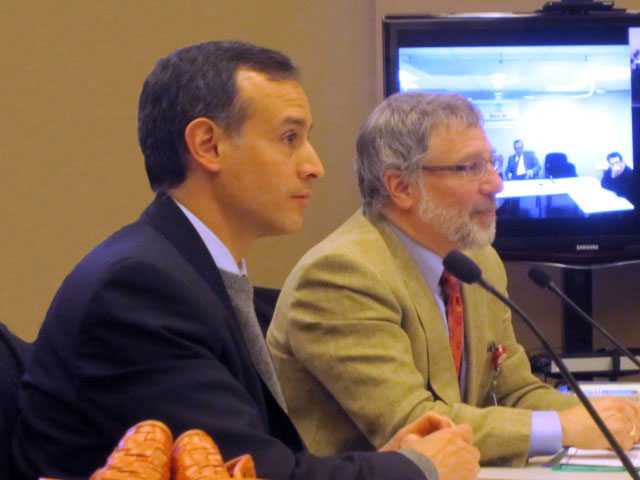Building Cross-Border Public Health Partnerships

Hugo Lopez-Gatell, MD, Mexico’s former Director General of Epidemiology and Marty Cetron, MD, Director of the Division of Global Migration and Quarantine within CDC’s National Center for Emerging and Zoonotic Infectious Diseases at a BTWG meeting held in February 2011.
“The formation of this work group has enabled public health authorities from both countries to engage in timely, meaningful deliberations on health issues.”
Marty Cetron, MD, Director of CDC’s Division of Global Migration and Quarantine
The United States and Mexico enjoy one of the most important binational relationships in the world. The two countries share a 1,969-mile border and are deeply connected economically and culturally. More than 30 million people of Mexican origin live throughout the United States, and approximately 300 million northbound legal crossings take place from Mexico into the United States annually. Additionally, about 15 million Americans visit Mexico each year, and more than 1 million Americans live in Mexico. The sheer number of people who live, work, and travel between the United States and Mexico has led to a sharing of culture and commerce as well as health issues, particularly infectious diseases.
To address these health issues and increase public health coordination between the United States and Mexico, the Binational Technical Work Group (BTWG) was established. The group, spearheaded by U.S. Centers for Disease Control and Prevention’s (CDC) Division of Global Migration and Quarantine (DGMQ), brings together key public health professionals each quarter to discuss how to deal with public health priorities.
CDC and Mexican public health officials meet to discuss collaboration on recent outbreaks and laboratory issues. “It is always best, regardless of culture or language, to meet your collaborators face-to-face to ensure ongoing partnerships and understanding,” noted David Swerdlow, MD, founding member of the BTWG and Senior Advisor from CDC’s National Center for Immunization and Respiratory Disease.
The BTWG meetings help increase coordination, communication, and technical assistance for public health issues. Dr. Celia Alpuche-Aranda explained, “BTWG allows us to align all [our] projects…and budgets to optimize human resources and funding to better achieve our goals. This favors a much better understanding of the epidemiologic surveillance systems in both countries that facilitate collaborative efforts in joint outbreak investigations and policy decisions.”
Participants from both Mexico and the United States said that the BTWG meetings have been a resounding success and that they look forward to stronger relationships between their two countries as a result of the group.
- Page last reviewed: December 23, 2016
- Page last updated: December 23, 2016
- Content source:


 ShareCompartir
ShareCompartir